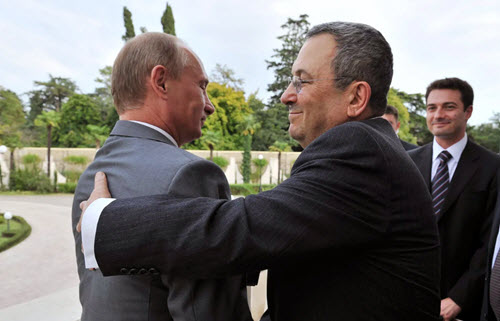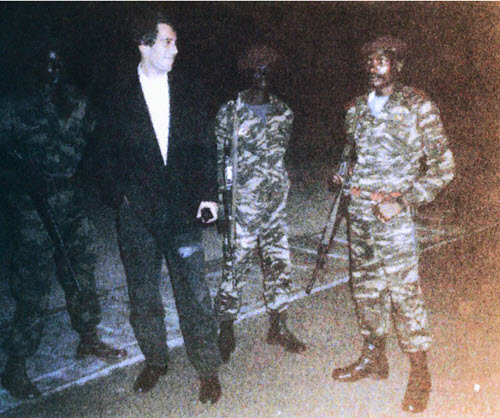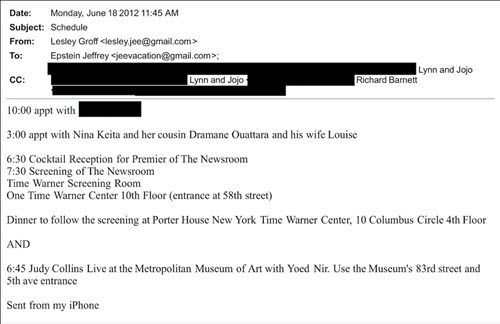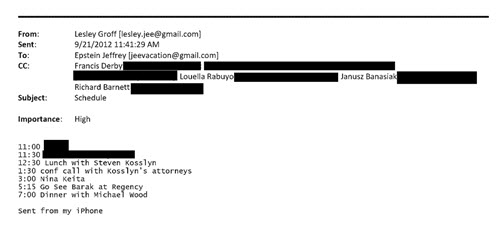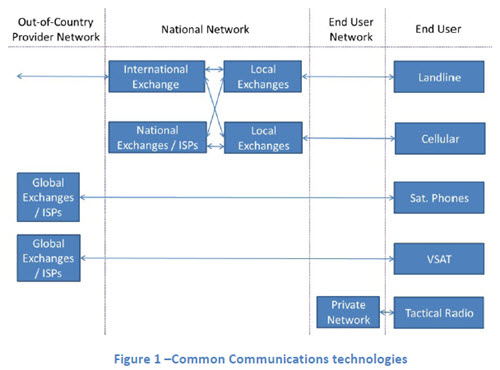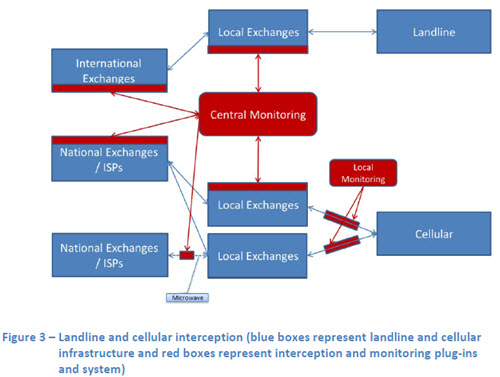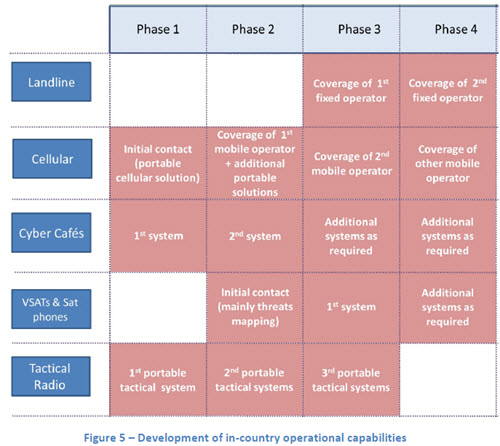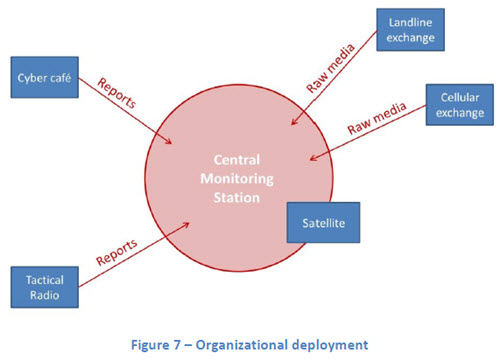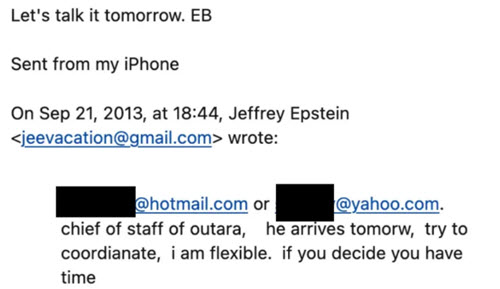Dropsite News Investigates Epstein Ties To Intelligence
Jeffrey Epstein Helped Broker Israeli Security Agreement With Mongolia
by Murtaza Hussain and Ryan Grim
Dropsite News
Sep 28, 2025
https://www.dropsitenews.com/p/jeffrey- ... urity-deal
NOTICE: THIS WORK MAY BE PROTECTED BY COPYRIGHT
Jeffrey Epstein used his political network and financial resources to help broker a security cooperation agreement between the governments of Israel and Mongolia, according to a trove of leaked emails from former Israeli Prime Minister Ehud Barak. This new set of emails between Barak and Epstein has largely been ignored by the mainstream press, but includes crucial new context on Epstein’s operation.
It’s well known that Epstein had personal ties to Israel, including to senior political officials like Barak and Ehud Olmert, and that he donated to organizations like Friends of the IDF. But Epstein’s activities in Mongolia show, for the first time, that he facilitated a deal that led to a security agreement between Israel and other nations.
The leaked emails were released by Handala, a pro-Palestinian hacking group with speculated ties to Iran. The documents were posted by Distributed Denial of Secrets, a non-profit whistleblower and file-sharing website. Although the emails lack cryptographic signatures, they contain a vast amount of unpublished private photographs and documents from Barak and his inner circle, including information that was not publicly known at the time. (More on the verification at the bottom of this article.)
Messages spanning from 2013 to 2016 show intimate, oftentimes daily correspondence between Barak and Epstein. Their conversations address political and business strategy as Epstein coordinated meetings for Barak with other members of his elite circles. In 2008, Epstein pled guilty to charges of “procuring a minor for prostitution”; Barak has denied knowledge of Epstein’s sex trafficking and abuse of minors.
This article is the first in a series that will explore Epstein’s work on behalf of Israeli military interests, particularly as it relates to his role in the development of Israel’s cyber warfare industry.
The rise of Israel’s cyber surveillance and weapons industry has been one of the most significant geopolitical developments of the past two decades, making sophisticated hacking tools available as “turnkey” packages to police and military around the world. The spread of “zero-click” exploits that require no interaction from targets, coupled with the proliferation of web-connected devices in homes, offices, and manufacturing facilities, has transformed what is possible for spy agencies and those in their orbit.
In the shadows of Israel’s cyber boom was Jeffrey Epstein, who exploited his network of political and financial elites to help Barak, and ultimately the Israeli government itself, to increase the penetration of Israel’s spy-tech firms into foreign countries. Epstein actively supported the Israeli intelligence industry via venture capital investments and contributions to charitable organizations – “non-governmental” entities that laid the foundation for official Israeli security deal-making. The story of Israel’s 2017 security agreement with Mongolia is a window into the true nature and scope of Epstein’s operation.
Doing this work is not cost-free—even the relatively modest first story below invited baseless legal threats—and it’s only possible with support from our readers. If you haven’t already, please upgrade to a paid subscription or make a one-time contribution.

Ehud Barak in Mongolia in April 2013, sent in an email with the subject line, “Me and double dabeshet camel.”
How Jeffrey Epstein Helped to Broker an Israeli Security Agreement With Mongolia
By Murtaza Hussain and Ryan Grim
In April 2013, almost exactly one month after leaving his post as Israel’s Defense Minister, Ehud Barak visited Mongolia to meet President Tsakhiagiin Elbegdorj and top security officials. The Mongolia plan had been set in motion in January of that year, while Barak, the country’s former prime minister, was still serving in the Israeli government. The broader goal of the meeting was to promote the Israeli defense industry’s introduction into the Mongolian market, while seeking business opportunities for clients of Barak’s consulting business. During his visit, Barak received a tour of the Special Operations Forces Training Center near Ulaanbataar.
Not physically present, but helping coordinate events behind the scenes, was Jeffrey Epstein, according to a trove of hacked emails between Epstein and Barak posted by Distributed Denial of Secrets and confirmed as authentic by Drop Site. Epstein, a New York financier and elite fixer who later became notorious for his role as a sex trafficker of underage girls, died in jail in 2019. In addition to his criminal activities, he also used his elite connections to broker an agreement for Israel, the emails reveal.
Barak’s visit to Mongolia aligned with a visit by Terje Rød-Larsen, president of the International Peace Institute, a non-profit think tank specializing in multilateral diplomacy. Barak and Rød-Larsen were both members of Epstein’s social circle, and well-acquainted; Rød-Larsen was a key mediator in the 1993 and 1995 Oslo Accords between Israel and the Palestine Liberation Organization, when Barak led the Israel Defense Forces. Before Barak left government, at least by 2010, the two maintained an informal backchannel in Barak’s personal email inbox, scheduling meetings and sharing articles on international diplomacy.
On April 21, 2013, Barak arranged a meeting at Epstein’s New York mansion for an “overview of the coming days.” The next day, Rød-Larsen sent Barak an email with details for a proposed advisory team consisting of “internationally-recognized experts” who could facilitate foreign investment in key industries in Mongolia. The draft proposal highlighted the great “opportunity” of Mongolia’s “massive natural resources (mostly minerals and metals),” promising to accelerate Mongolia’s economic growth and bolster its international status. Barak replied to Rød-Larsen’s proposal: “Thoughtful, far looking and necessary.”
Correspondence between Barak and Epstein in April 2013 shortly before his departure for Mongolia. (All timestamps for the emails are Asia/Kabul local time).
The archived conversations show Barak and Epstein arranged two more meetings in New York on April 22 and April 24. Barak landed in Ulaanbataar in the evening of April 26, according to an itinerary emailed by the Consul General of Mongolia to Israel. Early the next morning, Barak tried to reach Epstein for a final phone call: “Jeff hi[.] I can’t reach you on any phone. Pl try calling me. In about an hour I shall start meetings here. It’ll be more complicated.”
Barak’s message to Epstein shortly after arriving in Mongolia to participate in meetings with Mongolian officials in late April 2013.
On April 27, 2013, the itinerary shows Barak met with the Secretary of the National Security Council of Mongolia, Enkhtuvshin Tsagaandari, followed by President Elbegdorj, the Foreign Minister, and the Defense Minister. At Barak’s request, the CEO of Israel Weapon Industries (a spin-off of state-owned Israel Military Industries) delivered a gift to Tsagaandari, a Jericho pistol in a box engraved with the date, and a message: “in appreciation of friendship, cooperation, and good faith.”

Jericho pistol gifted to Secretary of the National Security Council of Mongolia, Enkhtuvshin Tsagaandari. Photo sent by the CEO of Israel Weapons Industries to Ehud Barak on April 17, 2013.
Barak saw clear opportunities for profit in Mongolia. During the visit, Barak sent an email to Russian-Israeli oligarch Viktor Vekselberg, asking to speak urgently on the phone. In the days leading up to the trip, Barak had negotiated a consulting agreement to develop energy, mining, and other industrial opportunities for Vekselberg’s Renova Group conglomerate. Barak wrote to Vekselberg on April 28: “I’m in Mongolia. Already met with most of the leaders from the President downwards and several business people…I have a thought that could probably help.”
On April 29, in between meetings with Mongolian officials and events marking Mongolia’s presidency of the Community of Democracies, Rød-Larsen chaired a panel discussion on the Arab Spring at a democracy promotion event in Ulaanbataar, which Barak joined as a participant. The same day, Rød-Larsen signed a Memorandum of Understanding with Mongolian Foreign Minister Luvsanvandan Bold to deepen the country’s cooperation with IPI.
Epstein began recruiting his associates to participate in IPI’s Mongolia advisory council. On September 28, 2013, Epstein emailed Barak to float the idea of working alongside Lawrence Summers, a Harvard economist who served in the Clinton and Obama administrations: “spent the afternoon with Larry Summers, I think he would work well with you.” Barak responded affirmatively: “I think greatly of him especially in re to advise for Sovereign Heads. We can complement each other effectively with a lot of synergies.”
In December 2013, IPI submitted a “Mongolia Presidential Advisory Agreement” to Mongolian authorities, establishing the group of experts who would advise on institutional reforms to promote “global peace and security.” The agreement also stipulated a $100,000 payment to each member of the Mongolia Presidential Advisory Board, according to a 2020 investigation by Norwegian newspaper Dagens Næringsliv (DN).
On January 24, 2014, the Advisory Board held its inaugural meeting at the Intercontinental Hotel in Davos, Switzerland, attended by the Mongolian President and National Security Advisor, Rød-Larsen, and Lawrence Summers. Joining by telephone were Kjell Bondevik (former PM of Norway), Kevin Rudd (former PM of Australia), Barak, and Epstein. Epstein’s professional affiliation in the meeting agenda was listed as “financier.”
The Davos meeting coincided with that year’s World Economic Forum (WEF), an annual gathering of global elites. News reports confirm Summers attended that year’s confab. The Intercontinental Hotel is a hub of action at Davos, and that same evening, according to photos posted online, WEF founder Klaus Schwab attended “Mongolia Night” with the nation’s president.
According to draft minutes from the meeting attached in an email to Barak from the IPI, Summers proposed that Mongolia create a sovereign wealth fund to invest “aggressively” in equities using proceeds from commodity exports. He also advised improving relations with the multinational mining company, Rio Tinto. Epstein recommended an evaluation of “all of the country’s financial structures and institutions,” in addition to the sovereign wealth fund. Barak advised that Mongolia’s armed forces should focus on “internal security issues,” especially “the need for good intelligence.” Bondevik described the importance of civil society programs and the “Scandinavian welfare model” as a method of promoting good governance.”
Bondevik would later deny that Epstein was present at the meeting, telling DN that, “I do not remember Epstein participating in our conference calls and his name was not mentioned in this context.” Drop Site’s email to The Oslo Center, an NGO that lists Bondevik as its founder and executive chair, went unanswered. Epstein and Barak continued to correspond regularly, with Epstein counseling the former Israeli politician on how to leverage his contacts to make money. On February 21, Epstein wrote to Barak, “with civil unrest exploding in ukraine syria, somolia [sic], libya, and the desperation of those in power, isn’t this perfect for you.” Barak replied: “You’re right [in] a way. But not simple to transform it into a cash flow. A subject for Saturday.”
By February 24, 2014, Barak had not yet been paid for his participation in the Advisory Board, and he sent an email to Epstein: “Thx for the time and energy you invest in supporting my efforts to bring home more bread...should I send Terja [sic] my Transfer info? Or wait for him to approach me?”
Epstein replied: “yes to terje, im always there for you.”
“We Should Send it to Jeff”
Epstein’s involvement with the Advisory Board deepened further in the following months. On April 28, 2014, he emailed Barak to set up a phone call to discuss Mongolia. Barak, though a year out of government, was still heavily involved in unofficial national security engagements— high-level state visits as a private citizen, consultation on security issues—sometimes followed by an official agreement with the Israeli government.
On May 2, 2014, Epstein pinged Barak to remind him to deliver a Mongolia proposal to Rød-Larsen. The following day, Barak sent Rød-Larsen a detailed policy memo covering military intelligence, emergency services, and a national rapid response force. He offered a plan to “modernize Sigint, Humint and Visint capabilities”—referring to electronic surveillance and the building of spy networks—“including UAV’s and mobile cellular networks monitoring systems.” The memo also recommended procurement of anti-tank missiles, high-precision artillery, and air defense systems. The proposal’s letterhead bears the official Emblem of Israel, which requires approval from the Israeli Minister of the Interior, over Barak’s name.
Barak likely stood to gain personally from these policy proposals. In the closing paragraph of the memo, Barak offered “to support Mongolia on other issues like modern agriculture, water [management] (including for the mining industry) and modern medical and diagnostic centers - based on Israeli experience in those areas.” Barak was concurrently pursuing his own agreements with several Israeli companies in the fields of mining, agri-biotech, and medical equipment, according to his emails.
For the next year, progress stalled: IPI tried unsuccessfully to schedule a one-on-one follow-up meeting between Barak and President Elbegdorj in late 2014. Then, in March 2015, Epstein loaned Barak $1,000,000 to fund an early-stage Israeli startup called Reporty Homeland Security. The company was co-founded by Pinhas Buchris, a former commander of both Israel’s Unit 8200 military intelligence unit and Unit 81, a high-tech intelligence unit. Reporty (now rebranded as “Carbyne”) enables emergency dispatchers and security services to retrieve precise location data and live video/audio feed from phones. The company was being piloted in local municipalities in Israel, and they planned for an international launch in November 2015.
On September 26, 2015, Epstein invited Barak, Rød-Larsen, President Elbegdorj and Foreign Minister Lundeg Purevsuren to his home in New York for dinner. Purevsuren emailed Barak and his wife later to say he enjoyed the meeting, and made plans to visit Israel. Five days after the dinner, on October 1, Rød-Larsen authorized payment of $100,000 to Epstein from IPI funds earmarked for the Mongolia Advisory Board, according to the Norwegian newspaper Dagens Næringsliv (DN). IPI has denied that Epstein ever received any payment from the Institute and DN found no explicit confirmation Epstein received the funds.

Ehud Barak and wife Nili Priel eat dinner at Epstein’s mansion (September 2015)
Internal IPI emails obtained by DN show another effort by Rød-Larsen to compensate Epstein. In January 2016, after Board member Kevin Rudd refused payment for his participation, Rød-Larsen proposed to give Rudd’s share to Epstein. He wrote in an email: “For forms sake we should send it to Jeff, however I am sure we will get it back many fold!”
For the next several months, Epstein and Barak pitched Reporty’s emergency response platform to potential investors. According to the leaked emails, Epstein arranged for Barak and Reporty co-founder Amir Elichai to meet Peter Thiel’s Valar Ventures partners Andrew McCormack and James Fitzgerald in New York in February. After the meeting, McCormack sent a follow-up email politely declining to invest; Valar was not convinced Reporty could “replace” legacy emergency notification systems. Elichai asked McCormack to reconsider: “We are not asking/forcing [governments] to change their current systems...We want to be the ‘Man in the middle.’”
The former prime minister used his national security résumé to open more doors: he pitched Reporty to Singapore National Security Minister Teo Chee Hean, and secured a pilot program with the Singaporean government. Barak introduced Elichai to an Israeli investor in Brazil who offered to pitch Reporty to the Rio de Janeiro head of security services.
According to investor materials emailed to Barak, the Reporty team also planned to deploy in Mongolia. A May 2016 investor presentation slide displayed a ‘pin’ on Mongolia with an annotation: “New region coming soon.”

Reporty Homeland Security, May 2016 investor presentation emailed to Barak.
In late 2017, Mongolian and Israeli security officials met in Ulaanbaatar. They agreed to cooperate on emergency services, and discussed “introducing Israeli advanced technology into [the] Mongolian emergency service.” In 2019, medical officers from the Israel Defense Forces participated in joint military exercises with the Mongolian Armed Forces for the first time.
While he played a vital part in helping lay the groundwork for the 2017 agreement between the two countries, based on his private correspondence with Barak it is unclear if Epstein helped execute this final step. Epstein’s emails to Barak’s personal inbox abruptly stopped shortly after April 22, 2016, the week of Ghislaine Maxwell’s deposition about her email contact with Epstein in Giuffre v. Maxwell in the Southern District of New York. Barak’s use of his personal email also tapered off around this time.
“Enjoy the Island”
Epstein’s alleged ties to foreign governments and intelligence agencies have been a source of speculation for years. But his role in the Mongolia Advisory Board plan and his intimate contacts with Barak, private sector tech firms tied to Israel’s security establishment, influential non-governmental organizations, and senior foreign government officials, show for the first time that he engaged in activities that altered the relationship between states—in this case, building formal security ties between the government of Israel and Mongolia.
After Epstein’s death in prison, some members of the Mongolia Advisory Board suffered fallout from their connections to him. Rød-Larsen resigned as the president of the IPI in 2020, after revelations that he received a personal loan from Epstein in 2013. The IPI has denied that the loan was connected to Institute activities or finances.
When the scandal of Rød-Larsen’s ties with Epstein became public, IPI issued a statement condemning Epstein, and hired ”Big Four” accounting firm KPMG to conduct a forensic audit. The auditors found five donations to IPI from Epstein-affiliated corporate entities between 2010 and 2019, totaling $650,000. IPI tax filings showed three contributions from Epstein in 2017 alone, amounting to $375,000. The organization announced that it would donate the equivalent sums to support victims of human trafficking and sexual assault.
IPI declined to comment on issues related to the prior leadership of the organization. Messages sent to an address associated with Larsen did not receive reply. Barak did not respond to a request for comment. Barak has previously denied his continued role in Israeli agreements after leaving office.
In the years since Barak’s ties to Epstein became publicly known, the former Israeli prime minister has attempted to downplay their connection. Barak admitted to visiting Epstein at his Manhattan residences and private Caribbean island, and he acknowledged working with Epstein to find business opportunities after leaving public office in Israel. But he said he only saw Epstein “on occasion,” and had no knowledge of his involvement in sex trafficking or abuse of young girls. Describing the disgraced financier as an enigma whose illegal private activities were kept secret, Barak called Epstein “a terrible version of Dr. Jekyll and Mr. Hyde.”
The emails reveal a close friendship between the two men. They bonded over music and mathematics, and Epstein at one point wrote Barak: “there are very few people that I enjoy spending time with, you are unique.” Barak often leaned on Epstein for guidance, and in his February 24, 2014 email about payment for the Mongolia Advisory Board, Barak signed off by sending a Skype contact to Epstein and asking him to provide a direct personal evaluation.
“Let me know once you’ve talked to him. And your impression,” Barak wrote. “In the meantime enjoy the Island.”
The Leaked Ehud Barak Emails
The two email accounts belonging to former Israeli Prime Minister Ehud Barak and leaked by the “Handala Hack Team” in October 2024 contain numerous corroborated details and contact information from Barak and his family and friends, as well as dozens of previously unpublished images and scanned documents from his personal and professional life. These materials reveal information that was not publicly available at the time the email leaks occurred, including a mention of Epstein’s “birthday book,” as well as private photographs, contracts, and memos from Barak’s work with the Mongolia Advisory Board and other consulting roles.
Handala announced the leaked “Israel Prime Minister Emails” on October 2, 2024. The release was accompanied by several of Barak’s private photos, including a “mirror selfie,” a Crusader-inspired knight costume, and the former prime minister’s Israeli passport. Other emails from the leak were previously reported by Reason Magazine in a story about Epstein’s connections to Barak and individuals in the global tech sector.
Handala is a pro-Palestinian hacking group that first appeared in December 2023, targeting mostly Israeli institutions and political figures for data theft and public leaks.
Researchers have speculated that Handala is affiliated with Iran’s Ministry of Intelligence. An analysis of the release by Drop Site News discovered a consistent email exporter timestamp offset corresponding to a local timezone of UTC+04:30 (Asia/Kabul, or Iran Daylight Time). Iran stopped observing Daylight Savings Time on September 22, 2022. The Handala dataset coverage ends in 2018, suggesting the files may have been exfiltrated several years before they were published.
Waqas Ahmed contributed reporting
by Murtaza Hussain and Ryan Grim
Dropsite News
Sep 28, 2025
https://www.dropsitenews.com/p/jeffrey- ... urity-deal
NOTICE: THIS WORK MAY BE PROTECTED BY COPYRIGHT
YOU ARE REQUIRED TO READ THE COPYRIGHT NOTICE AT THIS LINK BEFORE YOU READ THE FOLLOWING WORK, THAT IS AVAILABLE SOLELY FOR PRIVATE STUDY, SCHOLARSHIP OR RESEARCH PURSUANT TO 17 U.S.C. SECTION 107 AND 108. IN THE EVENT THAT THE LIBRARY DETERMINES THAT UNLAWFUL COPYING OF THIS WORK HAS OCCURRED, THE LIBRARY HAS THE RIGHT TO BLOCK THE I.P. ADDRESS AT WHICH THE UNLAWFUL COPYING APPEARED TO HAVE OCCURRED. THANK YOU FOR RESPECTING THE RIGHTS OF COPYRIGHT OWNERS.
Jeffrey Epstein used his political network and financial resources to help broker a security cooperation agreement between the governments of Israel and Mongolia, according to a trove of leaked emails from former Israeli Prime Minister Ehud Barak. This new set of emails between Barak and Epstein has largely been ignored by the mainstream press, but includes crucial new context on Epstein’s operation.
It’s well known that Epstein had personal ties to Israel, including to senior political officials like Barak and Ehud Olmert, and that he donated to organizations like Friends of the IDF. But Epstein’s activities in Mongolia show, for the first time, that he facilitated a deal that led to a security agreement between Israel and other nations.
The leaked emails were released by Handala, a pro-Palestinian hacking group with speculated ties to Iran. The documents were posted by Distributed Denial of Secrets, a non-profit whistleblower and file-sharing website. Although the emails lack cryptographic signatures, they contain a vast amount of unpublished private photographs and documents from Barak and his inner circle, including information that was not publicly known at the time. (More on the verification at the bottom of this article.)
Messages spanning from 2013 to 2016 show intimate, oftentimes daily correspondence between Barak and Epstein. Their conversations address political and business strategy as Epstein coordinated meetings for Barak with other members of his elite circles. In 2008, Epstein pled guilty to charges of “procuring a minor for prostitution”; Barak has denied knowledge of Epstein’s sex trafficking and abuse of minors.
This article is the first in a series that will explore Epstein’s work on behalf of Israeli military interests, particularly as it relates to his role in the development of Israel’s cyber warfare industry.
The rise of Israel’s cyber surveillance and weapons industry has been one of the most significant geopolitical developments of the past two decades, making sophisticated hacking tools available as “turnkey” packages to police and military around the world. The spread of “zero-click” exploits that require no interaction from targets, coupled with the proliferation of web-connected devices in homes, offices, and manufacturing facilities, has transformed what is possible for spy agencies and those in their orbit.
In the shadows of Israel’s cyber boom was Jeffrey Epstein, who exploited his network of political and financial elites to help Barak, and ultimately the Israeli government itself, to increase the penetration of Israel’s spy-tech firms into foreign countries. Epstein actively supported the Israeli intelligence industry via venture capital investments and contributions to charitable organizations – “non-governmental” entities that laid the foundation for official Israeli security deal-making. The story of Israel’s 2017 security agreement with Mongolia is a window into the true nature and scope of Epstein’s operation.
Doing this work is not cost-free—even the relatively modest first story below invited baseless legal threats—and it’s only possible with support from our readers. If you haven’t already, please upgrade to a paid subscription or make a one-time contribution.

Ehud Barak in Mongolia in April 2013, sent in an email with the subject line, “Me and double dabeshet camel.”
How Jeffrey Epstein Helped to Broker an Israeli Security Agreement With Mongolia
By Murtaza Hussain and Ryan Grim
In April 2013, almost exactly one month after leaving his post as Israel’s Defense Minister, Ehud Barak visited Mongolia to meet President Tsakhiagiin Elbegdorj and top security officials. The Mongolia plan had been set in motion in January of that year, while Barak, the country’s former prime minister, was still serving in the Israeli government. The broader goal of the meeting was to promote the Israeli defense industry’s introduction into the Mongolian market, while seeking business opportunities for clients of Barak’s consulting business. During his visit, Barak received a tour of the Special Operations Forces Training Center near Ulaanbataar.
Not physically present, but helping coordinate events behind the scenes, was Jeffrey Epstein, according to a trove of hacked emails between Epstein and Barak posted by Distributed Denial of Secrets and confirmed as authentic by Drop Site. Epstein, a New York financier and elite fixer who later became notorious for his role as a sex trafficker of underage girls, died in jail in 2019. In addition to his criminal activities, he also used his elite connections to broker an agreement for Israel, the emails reveal.
Barak’s visit to Mongolia aligned with a visit by Terje Rød-Larsen, president of the International Peace Institute, a non-profit think tank specializing in multilateral diplomacy. Barak and Rød-Larsen were both members of Epstein’s social circle, and well-acquainted; Rød-Larsen was a key mediator in the 1993 and 1995 Oslo Accords between Israel and the Palestine Liberation Organization, when Barak led the Israel Defense Forces. Before Barak left government, at least by 2010, the two maintained an informal backchannel in Barak’s personal email inbox, scheduling meetings and sharing articles on international diplomacy.
On April 21, 2013, Barak arranged a meeting at Epstein’s New York mansion for an “overview of the coming days.” The next day, Rød-Larsen sent Barak an email with details for a proposed advisory team consisting of “internationally-recognized experts” who could facilitate foreign investment in key industries in Mongolia. The draft proposal highlighted the great “opportunity” of Mongolia’s “massive natural resources (mostly minerals and metals),” promising to accelerate Mongolia’s economic growth and bolster its international status. Barak replied to Rød-Larsen’s proposal: “Thoughtful, far looking and necessary.”
Re:
From: Jeffrey Epstein <[email protected]
To: ehud barak <[email protected]>
4/21/2013, 7:09:12 PM /Search
630
On Sunday, April 21, 2013, ehud barak wrote:
Shall we meet 6pm at your place for a. Overview of the coming days?
EB
Sent from my iPhone
On Apr 21, 2013, at 16:48, Jeffrey Epstein <[email protected]> wrote:
i will be back tonight at 5
************************************************
The information contained in this communication is confidential, may be attorney-client privileged, may constitute inside information, and is intended only for the use of the addressee. It is the property of Jeffrey Epstein
Correspondence between Barak and Epstein in April 2013 shortly before his departure for Mongolia. (All timestamps for the emails are Asia/Kabul local time).
Re: Fw:
From: ehud barak <[email protected]>
To: Terje Rod-Larsen <[email protected]>
4/22/2013, 3:57:04 PM /Inbox!47
Dear Terje
I believe it is a very goody idea. Thoughtful, far looking and necessary.
Best regards
Ehud
Sent from my iPhon
On Apr 22, 2013, at 13:50, Terje Rod-Larsen <[email protected]> wrote:
From: Andrea Pfanzelter
To: Terje Rod-Larsen
Sent: Mon Apr 22 06:15:03 2013
Subject:
DRAFT
The International Advisory Team for Mongolia
Background
Mongolia is going through a dramatic process of transition. With the end of the Soviet Union, Mongolia went through a peaceful revolution, introducing a multi-party system and a market economy.
Twenty years later, Mongolia has become one the fastest growing economies in the world (thanks mainly to its rich natural resources) and a beacon of democracy (e.g. by Chairing the Community of Democracies and joining the Organization for Security and Cooperation in Europe).
Barak’s response to Rød-Larsen’s proposal for the Mongolia Advisory Board in April 2013.
Correspondence between Barak and Epstein in April 2013 shortly before his departure for Mongolia. (All timestamps for the emails are Asia/Kabul local time).
The archived conversations show Barak and Epstein arranged two more meetings in New York on April 22 and April 24. Barak landed in Ulaanbataar in the evening of April 26, according to an itinerary emailed by the Consul General of Mongolia to Israel. Early the next morning, Barak tried to reach Epstein for a final phone call: “Jeff hi[.] I can’t reach you on any phone. Pl try calling me. In about an hour I shall start meetings here. It’ll be more complicated.”
Re: pl call
From: Jeffrey Epstein <[email protected]
To: ehud barak <[email protected]>
4/27/2013, 4:43:51 AM /Inbox!47
i tried call me now 212 533 3739
On Fri, Apr 26, 2013 at 5:42 PM, ehud barak <[email protected]> wrote:
Jeff hi
I can't reach you on any phone. Pl try calling me. In about an hour I shall start meetings here. It'll be more complicated.
Best
EB
Sent from my iPhone
On Apr 26, 2013, at 16:54, Jeffrey Epstein <[email protected] wrote:
Imon my cell 212 533 3739
--
************************************************
The information contained in this communication is confidential, may be attorney-client privileged, may constitute inside information, and is intended only for the use of the addressee. It is the property of Jeffrey Epstein
Barak’s message to Epstein shortly after arriving in Mongolia to participate in meetings with Mongolian officials in late April 2013.
On April 27, 2013, the itinerary shows Barak met with the Secretary of the National Security Council of Mongolia, Enkhtuvshin Tsagaandari, followed by President Elbegdorj, the Foreign Minister, and the Defense Minister. At Barak’s request, the CEO of Israel Weapon Industries (a spin-off of state-owned Israel Military Industries) delivered a gift to Tsagaandari, a Jericho pistol in a box engraved with the date, and a message: “in appreciation of friendship, cooperation, and good faith.”

Jericho pistol gifted to Secretary of the National Security Council of Mongolia, Enkhtuvshin Tsagaandari. Photo sent by the CEO of Israel Weapons Industries to Ehud Barak on April 17, 2013.
Barak saw clear opportunities for profit in Mongolia. During the visit, Barak sent an email to Russian-Israeli oligarch Viktor Vekselberg, asking to speak urgently on the phone. In the days leading up to the trip, Barak had negotiated a consulting agreement to develop energy, mining, and other industrial opportunities for Vekselberg’s Renova Group conglomerate. Barak wrote to Vekselberg on April 28: “I’m in Mongolia. Already met with most of the leaders from the President downwards and several business people…I have a thought that could probably help.”
On April 29, in between meetings with Mongolian officials and events marking Mongolia’s presidency of the Community of Democracies, Rød-Larsen chaired a panel discussion on the Arab Spring at a democracy promotion event in Ulaanbataar, which Barak joined as a participant. The same day, Rød-Larsen signed a Memorandum of Understanding with Mongolian Foreign Minister Luvsanvandan Bold to deepen the country’s cooperation with IPI.
Epstein began recruiting his associates to participate in IPI’s Mongolia advisory council. On September 28, 2013, Epstein emailed Barak to float the idea of working alongside Lawrence Summers, a Harvard economist who served in the Clinton and Obama administrations: “spent the afternoon with Larry Summers, I think he would work well with you.” Barak responded affirmatively: “I think greatly of him especially in re to advise for Sovereign Heads. We can complement each other effectively with a lot of synergies.”
In December 2013, IPI submitted a “Mongolia Presidential Advisory Agreement” to Mongolian authorities, establishing the group of experts who would advise on institutional reforms to promote “global peace and security.” The agreement also stipulated a $100,000 payment to each member of the Mongolia Presidential Advisory Board, according to a 2020 investigation by Norwegian newspaper Dagens Næringsliv (DN).
On January 24, 2014, the Advisory Board held its inaugural meeting at the Intercontinental Hotel in Davos, Switzerland, attended by the Mongolian President and National Security Advisor, Rød-Larsen, and Lawrence Summers. Joining by telephone were Kjell Bondevik (former PM of Norway), Kevin Rudd (former PM of Australia), Barak, and Epstein. Epstein’s professional affiliation in the meeting agenda was listed as “financier.”
The Davos meeting coincided with that year’s World Economic Forum (WEF), an annual gathering of global elites. News reports confirm Summers attended that year’s confab. The Intercontinental Hotel is a hub of action at Davos, and that same evening, according to photos posted online, WEF founder Klaus Schwab attended “Mongolia Night” with the nation’s president.
According to draft minutes from the meeting attached in an email to Barak from the IPI, Summers proposed that Mongolia create a sovereign wealth fund to invest “aggressively” in equities using proceeds from commodity exports. He also advised improving relations with the multinational mining company, Rio Tinto. Epstein recommended an evaluation of “all of the country’s financial structures and institutions,” in addition to the sovereign wealth fund. Barak advised that Mongolia’s armed forces should focus on “internal security issues,” especially “the need for good intelligence.” Bondevik described the importance of civil society programs and the “Scandinavian welfare model” as a method of promoting good governance.”
Notes From Mongolia Presidential Advisory Board Meeting
64.9KB ∙ PDF file
Download
Notes from Mongolia Presidential Advisory Board meeting
Davos, 24 January 2014
The inaugural meeting of the Mongolia Presidential Advisory Board was held in Davos on 24 January.
Taking part in person were:
• Tsakhiagiin Elbegdorj, President of Mongolia • Lundeg Purevsuren, National Security and Foreign Policy Advisor to the President of Mongolia
• Larry Summers, former Secretary of the US Treasury, former President of Harvard University, Charles W. Eliot University Professor, Harvard University
• Terje Roed-Larsen, former Deputy Prime Minister of Norway, President of the International Peace Institute (IPI)
Joining via telephone were:
• Ehud Barak, former Prime Minister of Israel
• Kjell Magne Bondevik, former Prime Minister of Norway, President of the Oslo Center for Peace and Human Rights
• Jeffrey Epstein, Financier
• Kevin Rudd, former Prime Minister of Australia
The Board was supported by a Secretariat comprised of Andrea Pfanzelter, Director of the IPI Vienna Office, and Walter Kemp, IPI Director for Europe and Central Asia.
The President began by thanking all members of the Board for agreeing to take part in this initiative, and to provide the President, and by extension Mongolia, with expertise to develop his country in a sustainable, stable and democratic way.
He observed that there is a tendency for people to think of Mongolia’s past (particularly Genghis Khan) rather than its future. The President underlined the country’s peaceful transformation from dictatorship to democracy over the past twenty years. He noted that he wants to create a new image for his country, and to develop opportunities for the future.
Mr. Bondevik highlighted the “Scandinavian welfare model”, including the comprehensive public responsibility for all facets of life, a strong role for the state in all policy areas, the active engage of civil society, strong organizations of employees and employers, and respect for the equal rights of all citizens. He underlined the safety of income (including employer-provided or public insurance), relatively low differences in income level, gender equality, and high participation rates in elections. Other elements of the Scandinavian model are: equal opportunity; social solidarity; security for all; job security; economic growth; innovation; and flexibility to meet new challenges. He mentioned the sovereign equity fund that is saving revenue from North Sea oil and gas for future generations.
The President noted that a law on creating future/sovereign wealth fund is currently going through parliament. He said that he would arrange for the law to be translated into English and shared with interested members of the Board.
Mr. Summers commented on fiscal policies and macro-economic tools. He noted that Mongolia currently has a relatively low credit rating and that the cost of borrowing is 5% (500 basis points) higher than for the US Treasury. This suggests a perception of high risk. Therefore it is important to bring the credit spread down. He noted that investor confidence could be increased by resolving issues between Rio Tinto and the Government of Mongolia in relation to the Oyu Tolgoi mine. A solution should be found in line with international obligations and honouring contracts that have been signed. The government should make it clear that it expects others to do the same. Such a negotiated solution would improve Mongolia’s credit worthiness and bring down interest costs.
In terms of the “future fund”, he advised to draw on best world practices to use proceeds from commodity exports. He advised the President to invest more aggressively than some other sovereign funds, i.e. in equities and not just government debt.
Mr. Epstein noted that it is important to look at all of the country’s financial structures and institutions – the sovereign wealth fund is only one part of it.
Mr. Rudd noted that Australia is a long-standing friend of Mongolia and, like Mongolia, is a big country with a small population. He recalled how a century ago Australia’s economy was based on agriculture and mining. Mining is the largest pillar in Australia’s economy, responsible for ten percent of the country’s wealth. Managing this non-renewable resource effectively is vital for the future. He underlined the importance of diversifying the economy.
He stressed the importance of honouring contracts for the sake of the country’s international reputation, particularly for attracting FDI. He noted the sometimes ruthless approach of mining companies, and underlined the importance of effective legislation. He suggested that the Mongolian government engage 2-3 experts to provide advice on best practices in the mining industry (like regulation, environmental protection).
On the issue of the pension fund in Norway, Mr. Bondevik stressed the need to resist the temptation to spend money from the sovereign equity fund for state projects, since that could overheat the economy and deplete resources for future generations.
Mr. Barak noted that he knows Mongolia well from several visits, and is familiar with its security situation and armed forces. He stressed that there is no threat of invasion from Mongolia’s neighbours. Therefore, the country’s limited armed forces should focus on internal security issues and making democracy safe. They should be versatile, agile and mobile and should be able to shift their centre of gravity quickly from one side of the country to the other. Because of the large size of the country and the small size of the security services, he stressed the need for good intelligence. He also stressed the need for a quick-deployment hospital unit, i.a. for disaster response.
Concerning next steps, the President expressed his desire for expert advice on the specific issue areas. He suggested that this could be done both through meetings of the Advisory Board, as well as consultations with, and visits by, individual members of the Board.
Mr. Roed-Larsen said that IPI would develop a concept paper containing proposals on democracy, stability, social welfare, and security in Mongolia. Areas to be taken into consideration would include:
• The public profile of Mongolia;
• Mongolia’s social welfare programs, to the benefit of the people;
• Mongolia’s fiscal policies and macroeconomic tools, including the structure and functions of the sovereign fund and its investment portfolio;
• Mongolia’s “Third Neighbors” policy and suggestions for how to further develop this cornerstone in the country’s foreign policy;
• Recommendations on how to further promote democracy in Mongolia as well as regional security context, based on further development of Mongolia’s democratic and human rights agenda for the people’s well-being and security.
The concept paper will be produced within the next 4 months, with the aim of the development and implementation of a comprehensive and operational plan within the next 3 years.
Bondevik would later deny that Epstein was present at the meeting, telling DN that, “I do not remember Epstein participating in our conference calls and his name was not mentioned in this context.” Drop Site’s email to The Oslo Center, an NGO that lists Bondevik as its founder and executive chair, went unanswered. Epstein and Barak continued to correspond regularly, with Epstein counseling the former Israeli politician on how to leverage his contacts to make money. On February 21, Epstein wrote to Barak, “with civil unrest exploding in ukraine syria, somolia [sic], libya, and the desperation of those in power, isn’t this perfect for you.” Barak replied: “You’re right [in] a way. But not simple to transform it into a cash flow. A subject for Saturday.”
Re:
From: ehud barak <[email protected]>
To: Jeffrey Epstein <[email protected]
2/22/2014, 2:06:06 AM /Search
You're right I n a way. But not simple to transform it into a cash flow. A subject for Saturday.
Best
EB
Sent from my iPhone
On Feb 21, 2014, at 15:10, Jeffrey Epstein <[email protected] wrote:
with civil unrest exploding in ukraine syria, somalia, libya, and the desperation of those in power, isn't this perfect for you
--
************************************************
The information contained in this communication is confidential, may be attorney-client privileged, may constitute inside information, and is intended only for the use of the addressee. It is the property of Jeffrey Epstein
Barak and Epstein frequently exchanged messages about political subjects, including this message from February 2014 on finding more clients for Barak.
By February 24, 2014, Barak had not yet been paid for his participation in the Advisory Board, and he sent an email to Epstein: “Thx for the time and energy you invest in supporting my efforts to bring home more bread...should I send Terja [sic] my Transfer info? Or wait for him to approach me?”
Epstein replied: “yes to terje, im always there for you.”
“We Should Send it to Jeff”
Epstein’s involvement with the Advisory Board deepened further in the following months. On April 28, 2014, he emailed Barak to set up a phone call to discuss Mongolia. Barak, though a year out of government, was still heavily involved in unofficial national security engagements— high-level state visits as a private citizen, consultation on security issues—sometimes followed by an official agreement with the Israeli government.
On May 2, 2014, Epstein pinged Barak to remind him to deliver a Mongolia proposal to Rød-Larsen. The following day, Barak sent Rød-Larsen a detailed policy memo covering military intelligence, emergency services, and a national rapid response force. He offered a plan to “modernize Sigint, Humint and Visint capabilities”—referring to electronic surveillance and the building of spy networks—“including UAV’s and mobile cellular networks monitoring systems.” The memo also recommended procurement of anti-tank missiles, high-precision artillery, and air defense systems. The proposal’s letterhead bears the official Emblem of Israel, which requires approval from the Israeli Minister of the Interior, over Barak’s name.
Barak Proposal
906KB ∙ PDF file
Download
Ehud Barak
Tel Aviv, May 3, 2014
H.E. Mr. Terja Larsen
For the Intention of the Office of the president of The Republic of Mongolia
Dear Terja
National Security Action Items for the Republic of Mongolia.
General
In the aftermath of my visit to Mongolia on May 2013 and our TeleConference on January 2014 I have formed the following recommendations for Action Items in the arena of National Security
This is a modular plan which could be implemented in phases according to priorities, preferences and choices as well as budget constraints or intra services procedural obstacles.
Action Items
1. Support for the shaping of a National Defense Security Strategy and Doctrine congruent with the needs of Mongolia in the 21st Century.
2. Support the planning and build up of National Rapid Response Forces - for National emergencies, national disasters or insurgency and security threats.
3. As a part of this effort, in accordance with the paradigm which will be chosen by the President of Mongolia, it is proposed to take the following steps:
a) National Intelligence Systems Reform
Modernize Sigint , Humint and Visint capabilities including UAV's and mobile cellular networks monitoring systems with the best available technologies and practices, to cover Internal and external threats.
It should be an overall 4 - 8 years plan with clear priorities from which a 1-2 year plan will be derived for the most urgent and critical systems. Procurement and training should be planned as well.
b) Special Forces
Standardization of special forces weapons and training methods. Making them the National Rescue and Search Unit for civilian accidents as well as the National Anti Terror Unit.
c) Cost effective Fighting Force
Modernization of armed services with advanced weapon systems:
(1) Anti Tank shoulder mounted long range guided missiles (Spike etc.)
(2) Artillery - high precision munition and weapon system.
(3) Field Intelligence integration with National Intelligence Systems and Drones (UAV's).
(4) Helicopter mobility for small size forces.
(5) Long Range Ground surface mobility for larger units.
(6) Point Air Defense protection for selected Presidential Instalations.
d) Mobile AirBorne Hospital for National Emergency Response Unit, (natural disaster, insurgency, terror etc.) based on experience acquired by friendly nations.
SUMMARY
* This approach, if well coordinated, can significantly improve within short time frame the operational effectiveness for emergency situations and provide better external/internal nationwide intelligence coverage at all times.
• The plan can lead to reduction in size of forces and maintenance costs over the long term
* It will make National Emergency Agencies both more efficient and much more self confident.
4. More detailed work should be followed and the execution through a working plan should be spread over 1 - 2 years for high priority projects and 4 - 8 years for the rest of the plan.
5. I would like to re-emphasize that beyond the above mentioned plan, I am ready to support Mongolia on other issues like modern agriculture, water managment (including for the mining industry) and modern medical and diagnostic centers - based on Israeli experience in those areas.
Ehud Barak
Former Prime Minister and Minister of Defense of the State of Israel
Barak likely stood to gain personally from these policy proposals. In the closing paragraph of the memo, Barak offered “to support Mongolia on other issues like modern agriculture, water [management] (including for the mining industry) and modern medical and diagnostic centers - based on Israeli experience in those areas.” Barak was concurrently pursuing his own agreements with several Israeli companies in the fields of mining, agri-biotech, and medical equipment, according to his emails.
For the next year, progress stalled: IPI tried unsuccessfully to schedule a one-on-one follow-up meeting between Barak and President Elbegdorj in late 2014. Then, in March 2015, Epstein loaned Barak $1,000,000 to fund an early-stage Israeli startup called Reporty Homeland Security. The company was co-founded by Pinhas Buchris, a former commander of both Israel’s Unit 8200 military intelligence unit and Unit 81, a high-tech intelligence unit. Reporty (now rebranded as “Carbyne”) enables emergency dispatchers and security services to retrieve precise location data and live video/audio feed from phones. The company was being piloted in local municipalities in Israel, and they planned for an international launch in November 2015.
Re: NY this week
From: From: Jeffrey E. <[email protected]
To: ehbarak <[email protected]>
9/27/2015, 4:37:08 AM /Inbox!9
Yes
On Saturday, 26 September, 2015, ehbarak <[email protected]> wrote:
Hi Jeff
Ok. Terja Larsen as well?
Best
EB
Sent from my iPhone
On Sep 27, 2015, at 22:39, jeffrey E. <[email protected] wrote:
any interest in the mongolian president monday night dinner at my house
On Sat, Sep 26, 2015 at 3:29 PM, ehbarak <[email protected]> wrote:
Hi Jeff
We're back Sunday afternoon. Will be glad to meet. Now in Aspen. Met Larry Summers. Had a dinner with Josh C. Ramo, Ito from Media lab. Met many others.
Let's set a time. We leave NY on Thursday.
Best
EB
Sent from my iPhone
On Sep 26, 2015, at 10:20 jeffrey E. <[email protected] wrote:
im in town all week
Epstein inviting Barak to dinner at his home in September 2015 with Rød-Larsen and Mongolian government officials.
On September 26, 2015, Epstein invited Barak, Rød-Larsen, President Elbegdorj and Foreign Minister Lundeg Purevsuren to his home in New York for dinner. Purevsuren emailed Barak and his wife later to say he enjoyed the meeting, and made plans to visit Israel. Five days after the dinner, on October 1, Rød-Larsen authorized payment of $100,000 to Epstein from IPI funds earmarked for the Mongolia Advisory Board, according to the Norwegian newspaper Dagens Næringsliv (DN). IPI has denied that Epstein ever received any payment from the Institute and DN found no explicit confirmation Epstein received the funds.

Ehud Barak and wife Nili Priel eat dinner at Epstein’s mansion (September 2015)
Internal IPI emails obtained by DN show another effort by Rød-Larsen to compensate Epstein. In January 2016, after Board member Kevin Rudd refused payment for his participation, Rød-Larsen proposed to give Rudd’s share to Epstein. He wrote in an email: “For forms sake we should send it to Jeff, however I am sure we will get it back many fold!”
For the next several months, Epstein and Barak pitched Reporty’s emergency response platform to potential investors. According to the leaked emails, Epstein arranged for Barak and Reporty co-founder Amir Elichai to meet Peter Thiel’s Valar Ventures partners Andrew McCormack and James Fitzgerald in New York in February. After the meeting, McCormack sent a follow-up email politely declining to invest; Valar was not convinced Reporty could “replace” legacy emergency notification systems. Elichai asked McCormack to reconsider: “We are not asking/forcing [governments] to change their current systems...We want to be the ‘Man in the middle.’”
The former prime minister used his national security résumé to open more doors: he pitched Reporty to Singapore National Security Minister Teo Chee Hean, and secured a pilot program with the Singaporean government. Barak introduced Elichai to an Israeli investor in Brazil who offered to pitch Reporty to the Rio de Janeiro head of security services.
According to investor materials emailed to Barak, the Reporty team also planned to deploy in Mongolia. A May 2016 investor presentation slide displayed a ‘pin’ on Mongolia with an annotation: “New region coming soon.”

Reporty Homeland Security, May 2016 investor presentation emailed to Barak.
In late 2017, Mongolian and Israeli security officials met in Ulaanbaatar. They agreed to cooperate on emergency services, and discussed “introducing Israeli advanced technology into [the] Mongolian emergency service.” In 2019, medical officers from the Israel Defense Forces participated in joint military exercises with the Mongolian Armed Forces for the first time.
While he played a vital part in helping lay the groundwork for the 2017 agreement between the two countries, based on his private correspondence with Barak it is unclear if Epstein helped execute this final step. Epstein’s emails to Barak’s personal inbox abruptly stopped shortly after April 22, 2016, the week of Ghislaine Maxwell’s deposition about her email contact with Epstein in Giuffre v. Maxwell in the Southern District of New York. Barak’s use of his personal email also tapered off around this time.
“Enjoy the Island”
Epstein’s alleged ties to foreign governments and intelligence agencies have been a source of speculation for years. But his role in the Mongolia Advisory Board plan and his intimate contacts with Barak, private sector tech firms tied to Israel’s security establishment, influential non-governmental organizations, and senior foreign government officials, show for the first time that he engaged in activities that altered the relationship between states—in this case, building formal security ties between the government of Israel and Mongolia.
After Epstein’s death in prison, some members of the Mongolia Advisory Board suffered fallout from their connections to him. Rød-Larsen resigned as the president of the IPI in 2020, after revelations that he received a personal loan from Epstein in 2013. The IPI has denied that the loan was connected to Institute activities or finances.
When the scandal of Rød-Larsen’s ties with Epstein became public, IPI issued a statement condemning Epstein, and hired ”Big Four” accounting firm KPMG to conduct a forensic audit. The auditors found five donations to IPI from Epstein-affiliated corporate entities between 2010 and 2019, totaling $650,000. IPI tax filings showed three contributions from Epstein in 2017 alone, amounting to $375,000. The organization announced that it would donate the equivalent sums to support victims of human trafficking and sexual assault.
IPI declined to comment on issues related to the prior leadership of the organization. Messages sent to an address associated with Larsen did not receive reply. Barak did not respond to a request for comment. Barak has previously denied his continued role in Israeli agreements after leaving office.
In the years since Barak’s ties to Epstein became publicly known, the former Israeli prime minister has attempted to downplay their connection. Barak admitted to visiting Epstein at his Manhattan residences and private Caribbean island, and he acknowledged working with Epstein to find business opportunities after leaving public office in Israel. But he said he only saw Epstein “on occasion,” and had no knowledge of his involvement in sex trafficking or abuse of young girls. Describing the disgraced financier as an enigma whose illegal private activities were kept secret, Barak called Epstein “a terrible version of Dr. Jekyll and Mr. Hyde.”
The emails reveal a close friendship between the two men. They bonded over music and mathematics, and Epstein at one point wrote Barak: “there are very few people that I enjoy spending time with, you are unique.” Barak often leaned on Epstein for guidance, and in his February 24, 2014 email about payment for the Mongolia Advisory Board, Barak signed off by sending a Skype contact to Epstein and asking him to provide a direct personal evaluation.
“Let me know once you’ve talked to him. And your impression,” Barak wrote. “In the meantime enjoy the Island.”
The Leaked Ehud Barak Emails
The two email accounts belonging to former Israeli Prime Minister Ehud Barak and leaked by the “Handala Hack Team” in October 2024 contain numerous corroborated details and contact information from Barak and his family and friends, as well as dozens of previously unpublished images and scanned documents from his personal and professional life. These materials reveal information that was not publicly available at the time the email leaks occurred, including a mention of Epstein’s “birthday book,” as well as private photographs, contracts, and memos from Barak’s work with the Mongolia Advisory Board and other consulting roles.
Handala announced the leaked “Israel Prime Minister Emails” on October 2, 2024. The release was accompanied by several of Barak’s private photos, including a “mirror selfie,” a Crusader-inspired knight costume, and the former prime minister’s Israeli passport. Other emails from the leak were previously reported by Reason Magazine in a story about Epstein’s connections to Barak and individuals in the global tech sector.
Handala is a pro-Palestinian hacking group that first appeared in December 2023, targeting mostly Israeli institutions and political figures for data theft and public leaks.
Researchers have speculated that Handala is affiliated with Iran’s Ministry of Intelligence. An analysis of the release by Drop Site News discovered a consistent email exporter timestamp offset corresponding to a local timezone of UTC+04:30 (Asia/Kabul, or Iran Daylight Time). Iran stopped observing Daylight Savings Time on September 22, 2022. The Handala dataset coverage ends in 2018, suggesting the files may have been exfiltrated several years before they were published.
Waqas Ahmed contributed reporting
